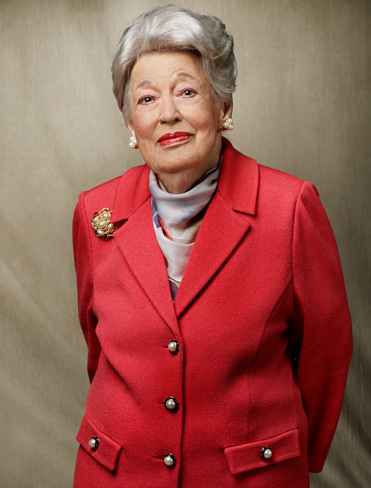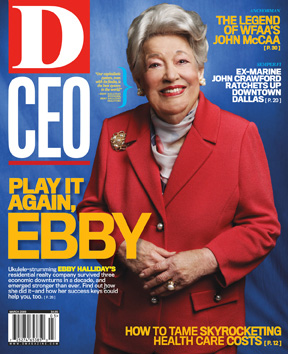Ebby Halliday, who turns 98 this month, has built one of the country’s largest residential real estate companies with gumption, hard work, and entrepreneurial skill. But, as shown in the following edited excerpt from a new book titled Ebby Halliday: The First Lady of Real Estate, it’s never been easy. While the 1980s brought especially severe challenges, Ebby and her late husband Maurice Acers—then the company’s chairman and general counsel—not only weathered the decade’s economic storms, but helped Ebby Halliday Realtors emerge from them stronger than ever.
A reporter for The Wall Street Journal interviewed Ebby and produced a flattering front-page story. On April 3, 1980, the Journal described Ebby Halliday Realtors’ corporate relocation program, how the program had evolved from helping individuals find a new home to helping entire companies relocate to Dallas. According to the article, the company was instrumental in smoothing the way for organizations like Dresser Industries, Associates Corp. of North America, Lennox Industries, Celanese Chemical, American Airlines, and Diamond Shamrock to resettle in the Southwest.
Revenue from the company’s relocation services accounted for 40 percent of total revenue in 1979. In the story, Ebby noted that with mortgage rates at 15 percent, companies were now making “mortgage-rate-differential” payments to compensate transferees for the higher interest rates on their new homes.
The story in the Journal led to more speaking invitations. The extra demand sparked an idea: Why not use surrogate speakers to handle requests Ebby couldn’t fulfill herself? No need to pass up an opportunity to have the firm’s name recognized at key events. Ebby selected two of her top people to go out and speak on the company’s behalf: Mary Frances Burleson, executive vice president and general sales manager, and June Feltman, former manager of the Preston Center office. Ebby recommended that both women begin attending Toastmasters International to polish their speaking skills prior to hitting the speaking circuit.
Ebby had an ulterior motive for cutting back her speaking engagements. She and Maurice decided to open two more offices in 1980. The new offices brought the total to 20. Ebby focused on recruiting the staff for an Ebby-caliber team. She spoke at several universities in the area, combining her recruiting message with her inspirational outlook.
At the closing session of a student-led free enterprise symposium, she told students, “Never has the world offered so much to young people. The opportunities to succeed are all around you. Learning the principles of free enterprise will be a marvelous beginning. Our capitalistic system, even with its faults, is the best system in the world. And you have an opportunity and privilege to make it better.”
She slipped in a recruiting pitch by telling the group that college graduates could go into real estate and begin making a substantial income. “The choice for young people embarking upon their careers has never been so great, especially for women. This is the best time in the world to be a woman and the perfect time for women to succeed in business.”
Ebby didn’t confine her speeches to real estate. During a talk to the Home & Apartment Builders of Metropolitan Dallas that summer, she told builders that the Carter administration had mishandled the economy. “In spite of all that’s gone on in Washington, we’ve been lucky here. Construction in the Dallas area almost boggles the mind. Nonetheless, our businesses stand to lose momentum if we have four more years of the same. The present administration’s mishandling of the economy has hit everybody, but Realtors and builders have born the brunt of the problem with sky-high interest rates.” She noted that national home sales were beginning to pick up, but if the Democrats in power were not replaced, a home construction slump could happen again.
Passing The Torch
After a few warm-up speaking appearances, Mary Frances was ready for the big leagues. In January of 1981, she was asked to speak to the Royal Institute of Chartered Surveyors in London, England. While Mary Frances was in England, America was in a recession. President Reagan was forced to admit as much in October of 1981. Several key industries, including housing, steel, and automobiles, experienced dramatic downturns. By September of 1982, however, the chairman of the Federal Reserve Board, Paul Volcker, had policies in place that appeared to break the back of inflation, pulling the rate down to 5 percent and in the process leaving 12 million people unemployed.
Meanwhile in the Sunbelt, the oil-patch and related industries remained reasonably healthy. The reason was the new oil crisis.
Oil prices rose from $14 a barrel in 1978 to $35 a barrel in 1981. At the higher price, domestic oil exploration in the Southwest became profitable once again. With new exploration came jobs in oil drilling, equipment sales, oil field services, and supporting commercial financial services. Dallas got its share of the activity and with it an increase in demand for commercial real estate. The oil boom touched off a commercial building boom in Dallas like none the city had ever experienced.
Oil companies and oil-related partnerships needed office space, and bankers couldn’t loan money fast enough to keep large-scale contractors happy and construction moving along. All this activity was taking place in the face of the Federal Reserve’s policies to ward off inflation by keeping interest rates high. Commercial lenders ignored the Fed and passed the cost of high-interest loans on to anyone with a plausible rationale for repayment.
New construction meant new jobs. And new jobs attracted workers from the Northeast. An influx of home buyers was good for the residential real estate market. The problem was that unlike commercial banks, home mortgage lenders scrutinized every loan application. With mortgage rates in the 15 percent to 17 percent range, many would-be homeowners couldn’t make the mortgage payment and therefore couldn’t afford to buy a home.
This situation created a demand for apartment rentals, which in turn, spurred additional commercial development. While the rest of the nation was economically anemic, the Southwest was experiencing spectacular growth.
Remarkably, the same period produced three more record-setting years for Ebby Halliday Realtors. By the summer of 1983, inflation had been tamed, having fallen from a rate of almost 15 percent at the beginning of 1980 to 2.5 percent in July. With mortgage rates falling to pre-1979 levels, pent-up demand for housing blossomed. To celebrate the return of lower interest rates, Hank Fulmer, an employee in the relocation division, composed new lyrics to the tune of “Happy Days Are Here Again.” As a kid, Ebby had learned to play the ukulele and so could manage the three chords needed for the melody. She dusted off her 1929 uke and, after a few days practice, debuted her new act at a meeting of the North Dallas Multiple Listing Service. She opened by saying, “You know, I really can’t play the ukulele or sing, but it helps to have a shtick; everybody needs a shtick.”
Interest Rates Are Down Again
(To the tune of “Happy Days Are Here Again”)
Happy days are here again,
Interest rates are down again,
Mortgagees have fixed-rate loans again,
Happy days are here again.
Builders’ starts are here again,
Hammers fly and roofers grin,
Home buyers rush to buy again,
Happy days are here again.
And even if closings are slow,
They’re bound to be up, we know—
So, all of us can smile again,
We’ll all be sure of jobs again,
We know that salesmanship will
always win,
Happy days are here again.
Ebby received a wild round of applause. A 72-year- old rock star had been born.






